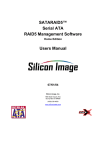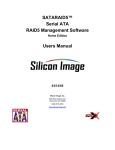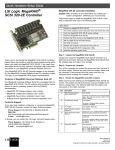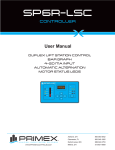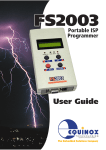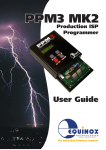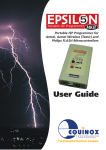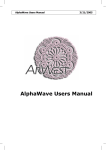Download LSI SATA 150 User's Manual
Transcript
USER’S GUIDE MegaRAID® SATA 150 Storage Adapters July 2006 Version 1.5 ® P/N: 80-00152-01 Rev. A Electromagnetic Compatibility Notices This device complies with Part 15 of the FCC Rules. Operation is subject to the following two conditions: 1. This device may not cause harmful interference, and 2. This device must accept any interference received, including interference that may cause undesired operation. This equipment has been tested and found to comply with the limits for a Class B digital device, pursuant to part 15 of the FCC Rules. These limits are designed to provide reasonable protection against harmful interference in a residential installation. This equipment generates, uses, and can radiate radio frequency energy and, if not installed and used in accordance with the instructions, may cause harmful interference to radio communications. However, there is no guarantee that interference will not occur in a particular installation. If this equipment does cause harmful interference to radio or television reception, which can be determined by turning the equipment off and on, the user is encouraged to try to correct the interference by one or more of the following measures: • • • • Reorient or relocate the receiving antenna. Increase the separation between the equipment and the receiver. Connect the equipment into an outlet on a circuit different from that to which the receiver is connected. Consult the dealer or an experienced radio/TV technician for help. LSI Logic is not responsible for any radio or television interference caused by unauthorized modification of this equipment or the substitution or attachment of connecting cables and equipment other than those specified by LSI Logic. The correction of interferences caused by such unauthorized modification, substitution, or attachment will be the responsibility of the user. The LSI Logic MegaRAID SATA storage adapters are tested to comply with FCC standards for home or office use. This Class B digital apparatus meets all requirements of the Canadian Interference-Causing Equipment Regulations. Cet appareil numérique de la classe B respecte toutes les exigences du Règlement sur le matériel brouilleur du Canada. This is a Class B product based on the standard of the Voluntary Control Council for Interference from Information Technology Equipment (VCCI). If this is used near a radio or television receiver in a domestic environment, it may cause radio interference. Install and use the equipment according to the instruction manual. LSI Logic Corporation North American Headquarters Milpitas, CA 408.433.8000 ii Copyright © 2002–2006 by LSI Logic Corporation. All rights reserved. This document contains proprietary information of LSI Logic Corporation. The information contained herein is not to be used by or disclosed to third parties without the express written permission of an officer of LSI Logic Corporation. LSI Logic products are not intended for use in life-support appliances, devices, or systems. Use of any LSI Logic product in such applications without written consent of the appropriate LSI Logic officer is prohibited. Purchase of I2C components of LSI Logic Corporation, or one of its sublicensed Associated Companies, conveys a license under the Philips I2C Patent Rights to use these components in an I2C system, provided that the system conforms to the I2C standard Specification as defined by Philips. Document P/N: 80-00152-01, Version 1.5 (July 2006) This document describes LSI Logic Corporation’s SATA 150 PCI to Serial ATA Storage Adapters and will remain the official reference source for all revisions/releases of these products until rescinded by an update. This manual applies to the MegaRAID SATA 1502, SATA 150-4, and SATA 150-6 storage adapters. LSI Logic Corporation reserves the right to make changes to any products herein at any time without notice. LSI Logic does not assume any responsibility or liability arising out of the application or use of any product described herein, except as expressly agreed to in writing by LSI Logic; nor does the purchase or use of a product from LSI Logic convey a license under any patent rights, copyrights, trademark rights, or any other of the intellectual property rights of LSI Logic or third parties. Copyright © 2002–2006 by LSI Logic Corporation. All rights reserved. TRADEMARK ACKNOWLEDGMENT LSI Logic, the LSI Logic logo design, MegaRAID, and Power Console Plus are registered trademarks of LSI Logic Corporation. Windows and Windows NT are registered trademarks of Microsoft Corporation. All other brand and product names may be trademarks of their respective companies. CD To receive product literature, visit us at http://www.lsilogic.com For a current list of our distributors, sales offices, and design resource centers, view our web page located at http://www.lsilogic.com/contacts/index.html iii Copyright © 2002–2006 by LSI Logic Corporation. All rights reserved. iv Copyright © 2002–2006 by LSI Logic Corporation. All rights reserved. Preface This book is the user’s guide for the MegaRAID® SATA 150 storage adapters. It contains complete physical installation instructions, as well as physical and electrical specifications, for the SATA 150 storage adapters. Audience This document assumes that you have some familiarity with RAID controllers and related support devices. The people who benefit from this book are: • Anyone installing an SATA 150 storage adapter in a host system • Engineers who are designing an SATA 150 storage adapter into a host system • Engineers and managers who are evaluating the SATA 150 storage adapter for possible use in a system Organization Use this manual to install and configure your MegaRAID SATA 150 storage adapter in the host system. This document has the following chapters and appendixes: • Chapter 1, Introduction, introduces the SATA 150 storage adapters and describes their main supported features. • Chapter 2, Hardware Installation, describes how to install an SATA 150 storage adapter in a host system. • Chapter 3, SATA 150 Storage Adapter Characteristics, provides the environmental and electrical specifications for the SATA 150 MegaRAID SATA 150 Storage Adapters User’s Guide Copyright © 2002–2006 by LSI Logic Corporation. All rights reserved. v storage adapters. This chapter also provides the mechanical drawing, jumper definitions, and connector locations for the SATA 150 storage adapters. • Appendix A, Glossary of Terms, defines terms and abbreviations that are used in this manual. • Appendix B, MegaRAID Problem Report Form, provides forms to send or fax to LSI Logic if you encounter difficulty with your SATA 150 storage adapter. MegaRAID System Installation Sequences and Document Organization The following table outlines the installation, configuration, and management tasks for a MegaRAID Serial ATA system. Each sequence consists of a series of steps and operations that the reference manual explains. LSI Logic recommends performing the tasks in this sequence when you install and configure the SATA 150 adapter. Sequence Task vi Reference Manual 1 Understand RAID system theory and operation. MegaRAID Configuration Software User’s Guide 2 Install the MegaRAID Serial ATA storage adapter and the related hardware. MegaRAID SATA 150 Storage Adapters User’s Guide 3 Configure the physical arrays and logical devices using either the MegaRAID Configuration Utility (CU) or the WebBIOS CU. MegaRAID Configuration Software User’s Guide 4 Install the MegaRAID device drivers. MegaRAID Device Driver Installation User’s Guide 5 Manage, monitor, and reconfigure the RAID array using either MegaRAID Configurathe MegaRAID Manager tool or the Power Console Plus™ tion Software User’s tool. Each tool runs under an operating system and can man- Guide age the RAID array while the system is operating. Preface Copyright © 2002–2006 by LSI Logic Corporation. All rights reserved. Related Publications MegaRAID Device Driver Installation User’s Guide Document Number: DB11-000018-02 This document explains how to install the MegaRAID device driver for your operating system. The information in this document is independent of the back-end bus and applies to both MegaRAID SCSI storage adapters and Serial ATA storage adapters. MegaRAID Configuration Software User’s Guide Document Number: DB15-000269-01 This document explains how to use the RAID system configuration, monitoring, and management tools that MegaRAID provides. These tools include the BIOS-based MegaRAID Configuration Utility and WebBIOS Configuration Utility, as well as the MegaRAID Manager OS-based tool and the Power Console Plus OS-based tool. The information in this document is independent of the back-end bus and applies to both MegaRAID SCSI storage adapters and Serial ATA storage adapters. Revision History Revision Date Remarks 1.5 July 2006 Corrected text about the J4 Write Pending connector for the SATA 150-6 and SATA 150-4 controllers. Updated jumper information to state not to use a jumper on the J1 connector for SATA 150-6 and SATA 150-4. In addition, updated contact information for Technical Support. 1.4 September 2004 Added information about drive roaming, drive migration, and alarm beep codes. Did general editing on the document. 1.3 November 2003 Added a note about operating system support, logical drive deletion, and headings for RAID Configuration Utilities and Technical Support in Chapter 1. Corrected version number for the Serial ATA specification (1.0). 1.2 September 2003 Added enclosure management information and updated the list of supported operating systems. Preface Copyright © 2002–2006 by LSI Logic Corporation. All rights reserved. vii Revision Date Remarks 1.1 April 2003 Added the MegaRAID SATA 150-4 RAID Storage Adapter (RSA). 1.0 December 2002 Initial release of this document. viii Preface Copyright © 2002–2006 by LSI Logic Corporation. All rights reserved. Contents Chapter 1 Introduction 1.1 1.2 Chapter 2 Hardware Installation 2.1 2.2 2.3 2.4 2.5 Overview of Main Adapter Features 1.1.1 Enclosure Management 1.1.2 Patrol Read 1.1.3 SMART Technology 1.1.4 Alarm Beep Codes 1.1.5 Drive Roaming and Drive Migration 1.1.6 Logical Drive Deletion 1.1.7 Background Initialization 1.1.8 Operating System Support 1.1.9 Technical Support SATA 150 Storage Adapter Characteristics 1.2.1 Hardware and Software Characteristics 1.2.2 Software Utility Support 1-1 1-2 1-2 1-2 1-3 1-4 1-4 1-5 1-5 1-6 1-6 1-7 1-8 Installation Overview Hardware Requirements Quick Installation Instructions Detailed Installation Instructions After Installing the Storage Adapter 2-1 2-2 2-2 2-3 2-5 Chapter 3 SATA 150 Storage Adapter Characteristics 3.1 MegaRAID PCI to Serial ATA Storage Adapters 3.1.1 MegaRAID SATA 150-6 MegaRAID SATA 150 Storage Adapters User’s Guide Copyright © 2002–2006 by LSI Logic Corporation. All rights reserved. 3-1 3-2 ix 3.2 3.1.2 3.1.3 Physical 3.2.1 3.2.2 3.2.3 MegaRAID SATA 150-4 MegaRAID SATA 150-2 and Environmental Specifications Electrical Characteristics Thermal and Atmospheric Characteristics Safety Characteristics Appendix A Glossary of Terms Appendix B MegaRAID Problem Report Form Customer Feedback x Contents Copyright © 2002–2006 by LSI Logic Corporation. All rights reserved. 3-4 3-6 3-8 3-8 3-8 3-9 Figures 2.1 3.1 3.2 3.3 Inserting the SATA SATA 150-6 Board SATA 150-4 Board SATA 150-2 Board 150 Storage Adapter in a PCI Slot Layout Layout Layout Contents Copyright © 2002–2006 by LSI Logic Corporation. All rights reserved. 2-4 3-3 3-5 3-7 xi xii Contents Copyright © 2002–2006 by LSI Logic Corporation. All rights reserved. Tables 1.1 1.2 3.1 3.2 3.3 3.4 3.5 B.1 B.2 B.3 Alarm Beep Codes SATA 150 Board Characteristics MegaRAID SATA 150 Characteristics SATA 150-6 Connector and Jumper Description SATA 150-4 Connector and Jumper Description SATA 150-2 Connector Definitions Maximum Power Requirements Customer Information System and Problem Information MegaRAID Array and Logical Device Configuration Contents Copyright © 2002–2006 by LSI Logic Corporation. All rights reserved. 1-3 1-7 3-1 3-3 3-5 3-7 3-8 B-1 B-2 B-3 xiii xiv Contents Copyright © 2002–2006 by LSI Logic Corporation. All rights reserved. Chapter 1 Introduction This chapter introduces the MegaRAID SATA 150 PCI to Serial ATA storage adapters and consists of the following sections: 1.1 • Section 1.1, “Overview of Main Adapter Features” • Section 1.2, “SATA 150 Storage Adapter Characteristics” Overview of Main Adapter Features The MegaRAID SATA 150 storage adapters provide a high-performance Intelligent PCI to High Speed Serialized AT Attachment (PCI-to-Serial ATA) interface with RAID control capabilities. These storage adapters provide reliability, high performance, and fault-tolerant disk subsystem management. You can install a SATA 150 adapter on a PCI bus and use it to connect Serial ATA drives to the host computer over a Serial ATA bus. SATA 150 storage adapters are an ideal RAID solution for the internal storage requirements of workgroup, departmental, and enterprise systems. SATA 150 storage adapters offer a cost-effective way to implement RAID in a server. MegaRAID SATA storage adapters support six, four or two Serial ATA ports. A single Serial ATA device can be connected to each port. Note: The MegaRAID SATA 150-2 is no longer available. The following are descriptions of the SATA 150 adapters: • The MegaRAID SATA 150-6 intelligent RAID controller and storage adapter uses three Silicon Image SiI3112A chips to support six Serial ATA ports. The Intel 80302 processor provides the intelligent RAID MegaRAID SATA 150 Storage Adapters User’s Guide Copyright © 2002–2006 by LSI Logic Corporation. All rights reserved. 1-1 management capabilities. The SATA 150-6 supports RAID 0, 1, 5, 10, and 50. 1.1.1 • The MegaRAID SATA 150-4 intelligent RAID controller and storage adapter uses two Silicon Image SiI3112A chips to support four Serial ATA ports. The Intel 80302 processor provides the intelligent RAID management capabilities. The SATA 150-4 supports RAID 0, 1, 5, and 10. • The MegaRAID SATA 150-2 RAID controller and storage adapter uses a Silicon Image SiI3112A chip to support two Serial ATA ports. The SATA 150-2 supports RAID 0 and 1. Enclosure Management The SATA 150-4 and SATA 150-6 controllers support enclosure management through the same protocols used for SCSI Accessed FaultTolerant Enclosures (SAF-TE), using an I2C interface to communicate with the storage enclosure processor. This feature allows you to use RAID capabilities provided by the SATA 150 adapters in an enclosure containing your hard drives. 1.1.2 Patrol Read The Patrol Read operation reviews your system for possible physical disk errors that could lead to physical disk failure, and then carries out actions to correct the errors. The goal is to protect data integrity by detecting physical disk failure before the failure can damage data. The corrective actions depend on the disk array configuration and type of errors. Note: 1.1.3 Patrol Read is a background operation and is designed to minimize the impact on I/O performance. SMART Technology The self-monitoring analysis and reporting technology (SMART) feature monitors the internal performance of all motors, heads, and physical disk electronics to detect predictable physical disk failures. This feature helps monitor physical disk performance and reliability, and protects the data on the physical disk. When problems are detected on a physical disk, you can replace or repair the physical disk without losing any data. 1-2 Introduction Copyright © 2002–2006 by LSI Logic Corporation. All rights reserved. SMART-compliant physical disks have attributes for which data (values) can be monitored to identify changes in values and determine whether the values are within threshold limits. Many mechanical failures and some electrical failures display some degradation in performance before failure There are numerous factors that relate to predictable physical disk failures, such as a bearing failure, a broken read/write head, and changes in spin-up rate. In addition, there are factors related to read/write surface failure, such as seek error rate and excessive bad sectors. Note: 1.1.4 See http://www.t13.org for Serial Attached ATA (SATA) interface specifications. Alarm Beep Codes The SATA 150-4 and SATA 150-6 adapters have a speaker that generates audible warnings when system errors or events occur. Beeps occur at one-second intervals. The audible warnings do not require any management software in order to work. Table 1.1 describes the alarm beep codes. Table 1.1 Alarm Beep Codes Event or Error Alarm Beep Code A drive is offline (three beeps, one second off) A drive is running in degraded mode (one beep, one second off) An automatic rebuild has been completed (one beep, three seconds off) The temperature is above or below the acceptable range (two beeps, two seconds off) The firmware receives a command from an application to test the speaker (four beeps) Overview of Main Adapter Features Copyright © 2002–2006 by LSI Logic Corporation. All rights reserved. 1-3 1.1.5 Drive Roaming and Drive Migration Note: Drive roaming and drive migration cannot be supported at the same time. One or the other feature can be supported at any one time, but not both features at the same time. Drive roaming (also known as configuration on disk) occurs when the hard drives are moved to different channels on the same controller and the controller detects the RAID configuration from the configuration information on the drives. Configuration data is saved in both non-volatile random access memory (NVRAM) on the RAID controller and on the hard drives attached to the controller. This maintains the integrity of the data on each drive, even if the drives have changed their target ID. Drive roaming is supported across channels on the same controller, except when cluster mode is enabled. Drive roaming does not work if you move the drives to a new controller and connect them to different channels. If you move drives to a new controller, they must be on the same channel/target as they were on the previous controller, in order to keep the same configuration. You must power off the host system and the drive enclosure before you use drive roaming. Drive migration is the transfer of a set of hard drives in an existing configuration from one controller to another. The drives must remain on the same channel and must be reinstalled in the same order as in the original configuration. 1.1.6 Logical Drive Deletion The SATA 150 controllers allow you to delete unwanted logical drives and then use the disk space for a new logical drive. You can use the configuration utilities to create the next logical drive from the noncontiguous free space (‘holes’) and from the newly created arrays. You can still create sequential logical drives, without using the noncontiguous segments. The utilities provide information about sequential segments, non-contiguous segments, and physical drives that have not been configured. You can use this information when you create logical drives. 1-4 Introduction Copyright © 2002–2006 by LSI Logic Corporation. All rights reserved. Please note the following: • You cannot delete a logical drive during a reconstruction. Also, you cannot delete a logical drive during a rebuild, initialization, or check consistency of a logical drive, if that drive has a higher logical drive number than the drive you want to delete. You must wait until these processes have completed before deleting the logical drive. • Drive size extension is not possible, even though you can use noncontiguous free space to create a new logical drive. • You cannot move an existing logical drive to another area to protect it from defragmentation caused by random deletion. The MegaRAID Configuration Software User’s Guide has detailed procedures for deleting logical drives. 1.1.7 Background Initialization Background initialization is a process to correct parity on the virtual disks. It ensures that striped data segments are the same on all physical disks in a disk array. The background initialization rate is controlled by the background initialization rate set using your array management software. You must stop an ongoing background initialization before you change the rate, or the rate change will not take effect. After you stop background initialization and change the rate, the rate change will take effect when you restart background initialization. Note: 1.1.8 Unlike initialization of virtual disks, background initialization does not clear data from the physical disks. Operating System Support The MegaRAID Serial ATA storage adapters support several major operating systems. LSI Logic provides device drivers and RAID management tools for operating systems on the Universal Driver Suite CD that accompanies the SATA boards. You can download the latest drivers and software from the download center on the LSI Logic web site at http://www.lsilogic.com/cm/DownloadSearch.do. Follow the steps to download the driver. Overview of Main Adapter Features Copyright © 2002–2006 by LSI Logic Corporation. All rights reserved. 1-5 Refer to the MegaRAID Device Driver Installation User’s Guide on the Universal Driver Suite CD for information about installing the device drivers. Be sure to use the latest Service Packs provided by the operating system manufacturer and review the readme file that accompanies the driver. Note: 1.1.9 The SATA 150 adapters do not support the Windows® NT operating system. See the LSI Logic web site for the latest operating systems and drivers. Technical Support For assistance installing, configuring, or running your MegaRAID SATA 150 RAID storage adapter, contact LSI Logic Technical Support. E-mail: [email protected] [email protected] (Europe) Phone Support: 1-800-633-4545 (North America) +44.1344.413.441 (Europe) Web Site: http://www.lsilogic.com/support/index.html 1.2 SATA 150 Storage Adapter Characteristics This section describes the hardware and software characteristics of the SATA 150 storage adapters, and the software utilities you can use for RAID management. All models of the SATA 150 storage adapter support these aspects of the Serial ATA and PCI specifications: • 1-6 Serial ATA, Revision 1.0, specification: – 150 Mbytes/s bus speed – Theoretical 1.5 Gbits/s data transfer rate Introduction Copyright © 2002–2006 by LSI Logic Corporation. All rights reserved. • 1.2.1 – Use a low-cost 7-pin connector with thin, flexible cables – Use low voltage signaling levels to reduce current draw, EM emission, and signal switching time PCI Specification, Version 2.2: – Backward compatible with previous implementations of the PCI specification – SATA 150-6 and SATA 150-4 boards conform to half-size PCI form factor. SATA 150-2 board conforms to low-profile PCI form factor. Hardware and Software Characteristics Table 1.2 lists hardware and software characteristics of the SATA 150 storage adapters. Table 1.2 SATA 150 Board Characteristics Feature SATA 150-6 SATA 150-4 SATA 150-2 Number of Serial ATA Ports 6 4 2 Intelligent RAID Management Yes, using the Intel 80302 processor Yes, using the Intel 80302 processor No PCI Bus Width and Speed 64-bit, 66 MHz 64-bit, 66 MHz 32-bit, 66 MHz PCI Data Transfer Rate1 533 Mbytes/s 533 Mbytes/s 266.5 Mbytes/s Supported RAID Levels 0, 1, 5, 10, and 50 0, 1, 5, and 10 0 and 1 SDRAM Support 64 Mbytes ECC SDRAM 64 Mbytes ECC SDRAM None Cache Function Write-back, Writethrough, Adaptive Read Ahead, Non-Read Ahead, Read Ahead, Cache I/O, Direct I/O Write-back, Writethrough, Adaptive Read Ahead, Non-Read Ahead, Read Ahead, Cache I/O, Direct I/O None Hot Spare Pool Yes Yes No Hardware Exclusive-OR Generation and Checking Yes Yes No Enclosure Management Support Using the I2C Interface Yes Yes No SATA 150 Storage Adapter Characteristics Copyright © 2002–2006 by LSI Logic Corporation. All rights reserved. 1-7 Table 1.2 SATA 150 Board Characteristics (Cont.) Feature SATA 150-6 SATA 150-4 SATA 150-2 BIOS RAID Management Tools MegaRAID CU, WebBIOS CU MegaRAID CU, WebBIOS CU MegaRAID CU Software RAID Management Tools MegaRAID Manager, Power Console Plus MegaRAID Manager, Power Console Plus MegaRAID Configuration Console Optional Battery Backup Unit Yes (LSIBBU01) No No 1. Theoretical transfer rate. 1.2.2 Software Utility Support In addition, they support some combination of these configuration and control applications (for details, see Table 1.2): • MegaRAID BIOS Configuration Utility (CU). Used to create arrays and hot spares, define and initialize logical drives, view properties of logical drives, controllers, and arrays, rebuild failed drives, and verify data redundancy in RAID 1, 5, 10, or 50 logical drives. This is a BIOS-resident utility. Start the utility by pressing CTRL+M during system boot. 1-8 • WebBIOS Configuration Utility (CU). Offers the same feature set as the MegaRAID BIOS CU. This is an HTML-based, BIOS-resident utility. Start the utility by pressing CTRL+H during system boot. • MegaRAID Manager. Offers the same feature set as the MegaRAID BIOS CU. This utility runs under the operating system. • Power Console Plus tool. This is an object-oriented GUI utility that configures and monitors RAID systems locally or over a network. Offers the same feature set as the MegaRAID BIOS CU, plus these RAID migration features that can be used while the system remains operational: – Adding a drive to a RAID logical drive – Converting from a RAID 0 configuration to a RAID 1 or 5 configuration by adding a physical drive – Changing a Degraded redundant logical drive to an Optimal RAID 0 logical drive Introduction Copyright © 2002–2006 by LSI Logic Corporation. All rights reserved. – Removing physical drives from a logical drive – Converting a RAID 1 or 5 logical drive to a RAID 0 logical drive for both local and networked RAID management The Power Console Plus tool runs under the Windows 2000, Windows XP, and Windows Server™ 2003 operating systems. The MegaRAID Configuration Software User’s Guide explains how to use these configuration and control applications. SATA 150 Storage Adapter Characteristics Copyright © 2002–2006 by LSI Logic Corporation. All rights reserved. 1-9 1-10 Introduction Copyright © 2002–2006 by LSI Logic Corporation. All rights reserved. Chapter 2 Hardware Installation This chapter explains how to install the MegaRAID SATA 150 storage adapters. This chapter consists of the following sections: 2.1 • Section 2.1, “Installation Overview” • Section 2.2, “Hardware Requirements” • Section 2.3, “Quick Installation Instructions” • Section 2.4, “Detailed Installation Instructions” • Section 2.5, “After Installing the Storage Adapter” Installation Overview Here is a high-level overview of how to install, configure, and operate MegaRAID SATA 150 storage controllers. Step 1. Install the hardware. Refer to Section 2.3, “Quick Installation Instructions,” or Section 2.4, “Detailed Installation Instructions,” for hardware installation instructions. Step 2. Configure the system BIOS. Refer to the system documentation for more information. Step 3. Run a RAID management utility to configure the Serial ATA drives into a RAID array. Refer to the MegaRAID Configuration Software User’s Guide for more information. Step 4. Install the operating system driver. Refer to the MegaRAID Device Driver Installation User’s Guide for more information. Step 5. Install and run the MegaRAID Manager tool or the Power Console Plus tool to manage the RAID system configuration and performance. Refer to the MegaRAID Configuration Software User’s Guide for more information. MegaRAID SATA 150 Storage Adapters User’s Guide Copyright © 2002–2006 by LSI Logic Corporation. All rights reserved. 2-1 2.2 Hardware Requirements You must have the following items to install and use a MegaRAID SATA 150 storage adapter: 2.3 • A MegaRAID SATA 150 storage adapter and device driver • Host computer with an available PCI expansion slot • Serial ATA disk drives and cables Quick Installation Instructions Follow these instructions to install your SATA 150 storage adapter if you have prior experience installing computer hardware. 2-2 Step 1. Unpack the MegaRAID storage adapter and inspect it for damage. Step 2. Power down the system and disconnect the power cord. Step 3. Remove the cover from the computer. Step 4. Configure the jumpers on the SATA 150 storage adapter. Step 5. Insert the MegaRAID SATA 150 storage adapter in an available PCI slot. Step 6. Configure the Serial ATA devices according to the instructions for each device. Step 7. Connect the Serial ATA cables between the SATA 150 storage adapter and the Serial ATA devices. Step 8. Replace the computer cover, reconnect the power cord, and power up the system. Hardware Installation Copyright © 2002–2006 by LSI Logic Corporation. All rights reserved. 2.4 Detailed Installation Instructions Here are detailed installation instructions for installing the SATA 150 storage adapter. Step 1. Unpack the SATA 150 storage adapter and inspect it for damage. Unpack and install the storage adapter in a static-free environment. Remove it from the anti-static bag and inspect it for damage. Contact LSI Logic or your MegaRAID OEM support representative if the storage adapter appears damaged. Step 2. Power down the system and remove the cover. Turn off the computer and physically remove the power cord from the back of the power supply. Remove the cover from the computer chassis. Step 3. Configure the jumpers on the SATA 150-6 or SATA 150-4 storage adapter. Chapter 3, “SATA 150 Storage Adapter Characteristics” lists jumper definitions and locations. The SATA 150-2 does not have any jumpers. Step 4. Insert the MegaRAID SATA 150 storage adapter in a PCI slot. Be sure you are properly grounded, so you do not damage the adapter with static electricity. Press down gently but firmly to properly seat the storage adapter in the slot, as shown in Figure 2.1. Detailed Installation Instructions Copyright © 2002–2006 by LSI Logic Corporation. All rights reserved. 2-3 Figure 2.1 Inserting the SATA 150 Storage Adapter in a PCI Slot Bracket Screw 32-bit PCI slots 5 V, 64-bit PCI slot 3.3 V, 64-bit PCI slots Step 5. Attach the bracket to the computer frame with the bracket screw. Step 6. Configure the Serial ATA devices and install them in the host system computer case. See the Serial ATA device documentation to determine any preinstallation configuration requirements. Step 7. Connect the Serial ATA cables between the SATA 150 storage adapter and the Serial ATA devices. Chapter 3, “SATA 150 Storage Adapter Characteristics” shows the connector locations on the MegaRAID SATA 150 storage adapter. 2-4 Hardware Installation Copyright © 2002–2006 by LSI Logic Corporation. All rights reserved. Step 8. Replace the computer cover, reconnect the power cord and network cables, and power up the system. During boot, the MegaRAID BIOS message appears: MegaRAID BIOS Version x.xx date (c) Copyright 2002, LSI Logic Corporation, USA MegaRAID SATA Adapter Card found at PCI Bus No:xx Dev No:xx The firmware takes several seconds to initialize while the adapter scans the Serial ATA ports. 2.5 After Installing the Storage Adapter After you install the storage adapter, you must install the device driver and define the logical drives and physical disk arrays. Refer to the MegaRAID Device Driver Installation User’s Guide for detailed device driver installation steps. Refer to the MegaRAID Configuration Software User’s Guide for detailed instructions on how to configure physical arrays and logical drives. After Installing the Storage Adapter Copyright © 2002–2006 by LSI Logic Corporation. All rights reserved. 2-5 2-6 Hardware Installation Copyright © 2002–2006 by LSI Logic Corporation. All rights reserved. Chapter 3 SATA 150 Storage Adapter Characteristics This chapter describes the characteristics of the MegaRAID SATA 150 PCI to Serial ATA storage adapters. The chapter includes these topics: 3.1 • Section 3.1, “MegaRAID PCI to Serial ATA Storage Adapters” • Section 3.2, “Physical and Environmental Specifications” MegaRAID PCI to Serial ATA Storage Adapters The MegaRAID SATA 150 storage adapters conform to the PCI Local Bus Specification, Revision 2.2, and are backward compatible with previous revisions of the PCI specification. The adapters also support the Serial ATA Specification, Version 1.0. The SATA 150-4 and SATA 150-6 storage adapters have an Intel 80302 processor that provides intelligent RAID management capability. Table 3.1 lists the MegaRAID SATA 150 storage adapters and summarizes the characteristics of each board. Table 3.1 Adapter MegaRAID SATA 150 Characteristics Ports RAID Modes PCI Bus Mode Board Dimensions SATA 150-6 6 0, 1, 5, 10, and 50 64 bits, 66 MHz 6.875 x 4.2 inches (174.63 × 106.68 mm) SATA 150-4 4 0, 1, 5, and 10 64 bits, 66 MHz 6.875 x 4.2 inches (174.63 × 106.68 mm) SATA 150-2 2 0 and 1 32 bits, 66 MHz 6.6 × 2.53 inches (167.6 × 64.3 mm) The following sections have detailed descriptions of each SATA 150 storage adapter. MegaRAID SATA 150 Storage Adapters User’s Guide Copyright © 2002–2006 by LSI Logic Corporation. All rights reserved. 3-1 3.1.1 MegaRAID SATA 150-6 The MegaRAID SATA 150-6 is an intelligent RAID controller that provides six Serial ATA ports and supports RAID 0, RAID 1, RAID 5, RAID 10, and RAID 50 arrays. The SATA 150-6 does the following: • Supports six Serial ATA channels: – Uses differential signaling – Transfers data in frames – Supports Serial ATA power management • Complies with the PCI 2.2 Specification • Supports up to a 64-bit/66 MHz PCI interface: – Functions in a 64-bit PCI slot – Functions at 66 MHz or 33 MHz – Supports 3.3 V and 5.0 V PCI signaling – Is backward compatible with previous versions of the PCI specification The MegaRAID configuration utility and the WebBIOS utility provide RAID management and configuration support before the operating system boots. The MegaRAID Manager tool and the Power Console Plus tool provide RAID management and configuration support after the operating system boots. The Power Console Plus tool enables the user to manage RAID functions over a network. 3-2 SATA 150 Storage Adapter Characteristics Copyright © 2002–2006 by LSI Logic Corporation. All rights reserved. Figure 3.1 shows the layout of the SATA 150-6. Figure 3.1 SATA 150-6 Board Layout Port 0 Port 1 Port 2 J7 J8 J9 Port 3 J10 Port 4 Port 5 J11 J1 J2 J3 J4 J5 J6 J12 J16 J13 J17 J15 J14 Table 3.2 lists the connectors on the SATA 150-6. Table 3.2 SATA 150-6 Connector and Jumper Description Jumpers and Connectors Description Setting J1 Reserved for internal use Do not install a jumper. J2 Open - BIOS enabled; Installed - BIOS disabled Open J3 Reserved for internal use – J4 Write Pending connector. Provides a signal that indicates when the on-board cache contains data and a write from the cache to the hard drives is pending. – J5 Serial I/O connector for Serial EPROM Open MegaRAID PCI to Serial ATA Storage Adapters Copyright © 2002–2006 by LSI Logic Corporation. All rights reserved. 3-3 Table 3.2 SATA 150-6 Connector and Jumper Description (Cont.) Jumpers and Connectors Description 2 J6 I C connector, used as the interface for the controller to communicate with a storage enclosure processor Open J7-J12 Port connectors (see Figure 3.1 for details) Optional J13 Enables Mode 0 Select Open J14 Enables 3.3 V load sharing from motherboard Optional J15 Battery backup daughter card connector Optional Reserved for internal use – J16, J17, JP1 3.1.2 Setting MegaRAID SATA 150-4 The MegaRAID SATA 150-4 is an intelligent RAID controller that provides four Serial ATA ports and supports RAID 0, RAID 1, RAID 5, and RAID 10 arrays. The SATA 150-4 does the following: • Supports four Serial ATA channels: – Uses differential signaling – Transfers data in frames – Supports Serial ATA power management • Complies with the PCI 2.2 Specification • Supports up to a 64-bit/66 MHz PCI interface: – Functions in a 64-bit PCI slot – Functions at 66 MHz or 33 MHz – Supports 3.3 V and 5.0 V PCI signaling – Is backward compatible with previous versions of the PCI specification The MegaRAID configuration utility and the WebBIOS utility provide RAID management and configuration support before the operating system boots. The MegaRAID Manager tool and the Power Console Plus tool provide RAID management and configuration support after the 3-4 SATA 150 Storage Adapter Characteristics Copyright © 2002–2006 by LSI Logic Corporation. All rights reserved. operating system boots. The Power Console Plus tool enables the user to manage RAID functions over a network. Figure 3.2 SATA 150-4 Board Layout J1 J2 Port 0 Port 1 Port 2 J7 J8 J9 J4 J5 Port 3 J6 J10 J16 J13 J17 Table 3.3 lists the connectors on the SATA 150-4. Figure 3.2 shows the layout of the SATA 150-4. Table 3.3 Jumpers and Connectors SATA 150-4 Connector and Jumper Description Description Setting J1 Reserved for internal use Do not install a jumper. J2 Open - BIOS enabled; Installed - BIOS disabled Open J4 Write Pending connector. Provides a signal that indicates when the on-board cache contains data and a write from the cache to the hard drives is pending. – J5 Serial I/O connector for Serial EPROM Open MegaRAID PCI to Serial ATA Storage Adapters Copyright © 2002–2006 by LSI Logic Corporation. All rights reserved. 3-5 Table 3.3 Jumpers and Connectors 3.1.3 SATA 150-4 Connector and Jumper Description (Cont.) Description 2 Setting J6 I C connector, used as the interface for the controller to communicate with a storage enclosure processor Open J7-J10 Port connectors (see Figure 3.2 for details) Optional J13 Reserved for internal use – J16, J17, JP1 Reserved for internal use – MegaRAID SATA 150-2 The MegaRAID SATA 150-2 RAID controller provides two Serial ATA ports and supports RAID 0 and RAID 1 arrays. The SATA 150-2 does the following: • – Uses differential signaling – Transfers data in frames – Supports Serial ATA power management • Complies with the PCI 2.2 Specification • Supports up to a 32-bit, 66 MHz PCI interface that: • 3-6 Supports two Serial ATA channels: – Functions in a 32-bit or 64-bit PCI slot – Functions at 66 MHz or 33 MHz – Supports 3.3 V and 5.0 V PCI signaling – Is backward compatible with previous versions of the PCI specification Provides RAID support before operating system loads with the MegaRAID configuration utility SATA 150 Storage Adapter Characteristics Copyright © 2002–2006 by LSI Logic Corporation. All rights reserved. Table 3.4 lists the connectors on the SATA 150-2. Figure 3.3 shows the layout of the SATA 150-2. Table 3.4 Figure 3.3 SATA 150-2 Connector Definitions Connector Number Description J1 Serial ATA Port 0 J2 Serial ATA Port 1 SATA 150-2 Board Layout Port 0 Port 1 J1 J2 PCI MegaRAID PCI to Serial ATA Storage Adapters Copyright © 2002–2006 by LSI Logic Corporation. All rights reserved. 3-7 3.2 Physical and Environmental Specifications The design and implementation of the Serial ATA storage adapters minimizes electromagnetic emissions, susceptibility to radio frequency energy, and the effects of electrostatic discharge. The board carries the CE mark, C-Tick mark, FCC Self-Certification logo, Canadian Compliance Statement, Korean MIC, Taiwan BSMI, and Japan VCCI, and it meets the requirements of CISPR Class B. 3.2.1 Electrical Characteristics Table 3.5 lists the maximum power requirements for the MegaRAID SATA 150 storage adapters under normal operation. Table 3.5 Maximum Power Requirements Host Adapter PCI/PCI-X +5.0 V PCI/PCI-X +3.3 V SATA 150-61 (load sharing enabled) 0.85 A 1.29 A Power Over the Operating Range 11 W 0 °C to 40 °C with BBU 0 °C to 45 °C without BBU 0A 7.6 W 0 °C to 45 °C N/A 1.77 W 0 °C to 45 °C 1.63 A SATA 150-61 (load sharing disabled) 0A SATA 150-4 1.5 A SATA 150-2 0.35 A 1. The total power for the SATA 150-6 takes into consideration the charging of the BBU from the +12 V and the on-board regulator efficiencies. 3.2.2 Thermal and Atmospheric Characteristics The atmospheric characteristics for the MegaRAID SATA 150 storage adapters are: 3-8 • Temperature range: 0 °C to 40 °C with BBU; 0 °C to 45 °C without BBU (dry bulb) • Relative humidity range: 20% to 80% noncondensing • Maximum dew point temperature: 32 °C SATA 150 Storage Adapter Characteristics Copyright © 2002–2006 by LSI Logic Corporation. All rights reserved. The following parameters define the storage and transit environment for the SATA 150 storage adapters: 3.2.3 • Temperature range: -40 °C to 105 °C (dry bulb) • Relative humidity range: 20% to 80% noncondensing Safety Characteristics All Serial ATA storage adapters meet or exceed the requirements of UL flammability rating 94 V0. Each bare board is also marked with the supplier’s name or trademark, type, and UL flammability rating. Because these boards are installed in a PCI bus slot, all voltages are below the SELV 42.4 V limit. Physical and Environmental Specifications Copyright © 2002–2006 by LSI Logic Corporation. All rights reserved. 3-9 3-10 SATA 150 Storage Adapter Characteristics Copyright © 2002–2006 by LSI Logic Corporation. All rights reserved. Appendix A Glossary of Terms BIOS Basic Input/Output System. The BIOS is software that provides basic read/write capability. It is usually stored as firmware. The system BIOS on the main board of a computer boots and controls the system. The BIOS on the storage adapter acts as an extension of the system BIOS. Configuration Refers to the way a computer is set up; the combined hardware components (computer, monitor, keyboard, and peripheral devices) that make up a computer system; or the software settings that allow the hardware components to communicate with each other. Device Driver A program that allows a microprocessor (through the operating system) to direct the operation of a peripheral device, such as a disk drive. Host The computer system in which a storage adapter is installed. The host uses the storage adapter to transfer information to and from devices attached to the storage adapter. PCI Peripheral Component Interconnect. A high performance local bus specification that allows connection of devices directly to computer memory. RAID Redundant Array of Independent Disks. An array of multiple independent hard disk drives that yields better performance than a Single Large Expensive Disk (SLED). A RAID disk subsystem improves I/O performance on a server using only a single drive. The RAID array appears to the host server as a single storage unit. I/O is expedited because several disks can be accessed simultaneously. Serial ATA Serialized AT Attachment. The Serial ATA bus is a high-speed, internal bus that provides a low pin count, low voltage level bus for device connections between a host adapter and a Serial ATA device. Storage Adapter A circuit board that provides a device connection between the host and the storage devices attached to the storage adapter. MegaRAID SATA 150 Storage Adapters User’s Guide Copyright © 2002–2006 by LSI Logic Corporation. All rights reserved. A-1 A-2 Glossary of Terms Copyright © 2002–2006 by LSI Logic Corporation. All rights reserved. Appendix B MegaRAID Problem Report Form Use the following form to report problems with your MegaRAID SATA 150 storage adapter. Table B.1 Customer Information Customer Information MegaRAID Serial ATA Information Name: Today’s Date: Company: Date of Purchase: Address: Invoice Number: City, State: Serial Number: Country: Number of Channels: Email address: Cache Memory: Phone: Firmware Version: Fax: BIOS Version: MegaRAID SATA 150 Storage Adapters User’s Guide Copyright © 2002–2006 by LSI Logic Corporation. All rights reserved. B-1 Table B.2 System and Problem Information Motherboard: BIOS Manufacturer: Operating System: BIOS Date: Operating System Version: Video Adapter: MegaRAID Driver Version: CPU Type and Speed: Network Card: System Memory: Other disk controllers installed: Other adapter cards installed: Description of problem: Steps necessary to re-create problem: 1. 2. 3. 4. B-2 MegaRAID Problem Report Form Copyright © 2002–2006 by LSI Logic Corporation. All rights reserved. Table B.3 MegaRAID Array and Logical Device Configuration Array Number RAID Mode, Stripe Size Array #0 Configuration Array #1 Configuration Array #2 Configuration Array #3 Configuration Array #4 Configuration Array #5 Configuration Array #6 Configuration Array #7 Configuration Array #8 Configuration Array #9 Configuration B-3 Copyright © 2002–2006 by LSI Logic Corporation. All rights reserved. B-4 MegaRAID Problem Report Form Copyright © 2002–2006 by LSI Logic Corporation. All rights reserved. Customer Feedback We would appreciate your feedback on this document. Please copy the following page, add your comments, and fax it to us at the number shown. If appropriate, please also fax copies of any marked-up pages from this document. Important: Please include your name, phone number, fax number, and company address so that we may contact you directly for clarification or additional information. Thank you for your help in improving the quality of our documents. MegaRAID SATA 150 Storage Adapters User’s Guide Copyright © 2002–2006 by LSI Logic Corporation. All rights reserved. Reader’s Comments Fax your comments to: LSI Logic Corporation Technical Publications M/S AF-198 Fax: 408.433.4333 Please tell us how you rate this document: MegaRAID SATA 150 Storage Adapters User’s Guide. Place a check mark in the appropriate blank for each category. Excellent Good Average Completeness of information Clarity of information Ease of finding information Technical content Usefulness of examples and illustrations Overall manual Fair Poor ____ ____ ____ ____ ____ ____ ____ ____ ____ ____ ____ ____ ____ ____ ____ ____ ____ ____ ____ ____ ____ ____ ____ ____ ____ ____ ____ ____ ____ ____ What could we do to improve this document? If you found errors in this document, please specify the error and page number. If appropriate, please fax a marked-up copy of the page(s). Please complete the information below so that we may contact you directly for clarification or additional information. Name Telephone Date Fax Title Department Company Name Street City, State, Zip Customer Feedback Copyright © 2002–2006 by LSI Logic Corporation. All rights reserved. Mail Stop

















































